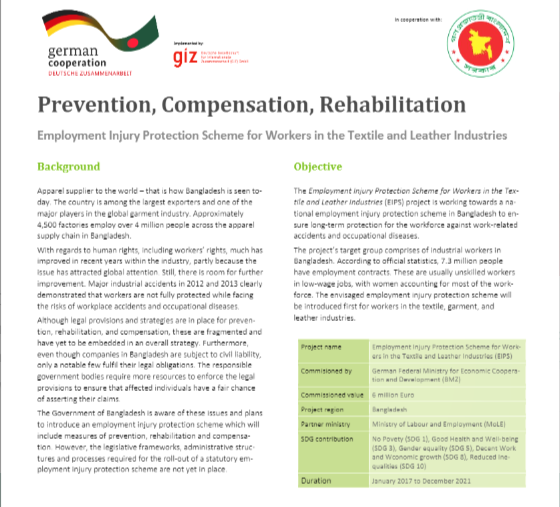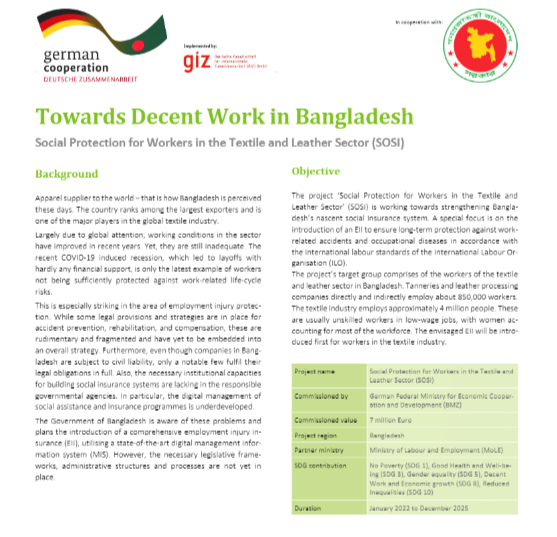
Employment Injury Protection Scheme for Workers in the Textile and Leather Industries (EIPS)
Dhaka , Bangladesh
Social protection, or social security, is a human right and is defined as the set of policies and programmes designed to reduce and prevent poverty as well as vulnerability to various risks throughout the life cycle. Social protection includes benefits for children and families, maternity, unemployment, employment injury, sickness, old age, disability, survivors, as well as health protection. Social protection systems address all these policy areas by a mix of contributory schemes (social insurance) and non-contributory tax-financed benefits (social assistance). Active and passive labour market policies, such as job trainings for the unemployed and minimum wage legislation, are also categorized as social protection measures.
Social Protection

Non-contributory

Social assistance refers to the provision of benefits financed from the general revenue of the government rather than by individual contributions, with benefits adjusted to the person’s needs. Social assistance schemes are either universal (i.e., providing benefits to all citizens, e.g., universal health care), categorical (i.e., providing benefits to one specific category of citizens such as children or the elderly), or poverty-targeting (i.e., providing benefits only to the poor by targeting individuals and households living under a defined threshold of income or assets). The benefits can be provided in cash or in-kind, examples being direct cash transfers and free school meals, respectively.

Contributory

Social insurance programmes are financed by individual contributions in the form of regular payments. There are various social insurance schemes, covering risks such as sickness, injury and disability, unemployment, old-age poverty, and maternity, respectively. The concept of social insurance is based on formal employment and depending on the scheme, contributions are shared between employer and employee (e.g., health insurance, unemployment insurance, old-age pensions) or fully borne by the employer (employment injury insurance). Employment injury insurance, the protection against work-related accidents and occupational diseases, is usually the first programme to be introduced when countries start to develop their social insurance system.

Labour market policies aim to protect the working population, especially low-income groups, from bad working conditions and precarious employment by ensuring basic labour standards and rights as well as adequate employment opportunities. One can distinguish between active and passive labour market policies: the former include policies that help people to acquire new skills (such as trainings and continuing education) and job-search services; the latter encompass labour market regulations such as minimum wage legislation and laws securing.
In Bangladesh, social protection is embedded in Article 15 (d) of the country’s National Constitution (1972). Currently, Bangladesh has 114 disparate social assistance programmes, primarily focused on food distribution and cash transfers (social assistance). In June 2015 the Government of Bangladesh adopted a new National Social Security Strategy (NSSS) with a view to strengthening the poverty impact of the public spending on social protection and to modernize the social security system to address the social security challenges of a middle-income economy. According to the accompanying Action Plan (2018), the Government of Bangladesh plans to introduce a National Social Insurance Scheme covering sickness, maternity pay and protection, old age pensions, workplace accidents and unemployment benefits for workers in the formal economy.
Apart from the Shurokkha project, GIZ and the ILO are supporting the Government of Bangladesh in introducing an Employment Injury insurance scheme for the ready-made garment sector via the following projects:

Employment Injury Protection Scheme for Workers in the Textile and Leather Industries (EIPS)

Social Protection for Workers in the Textile and Leather Sector (SOSI)